Anohito in CCFS
Anohito: CandyNeige Analysis
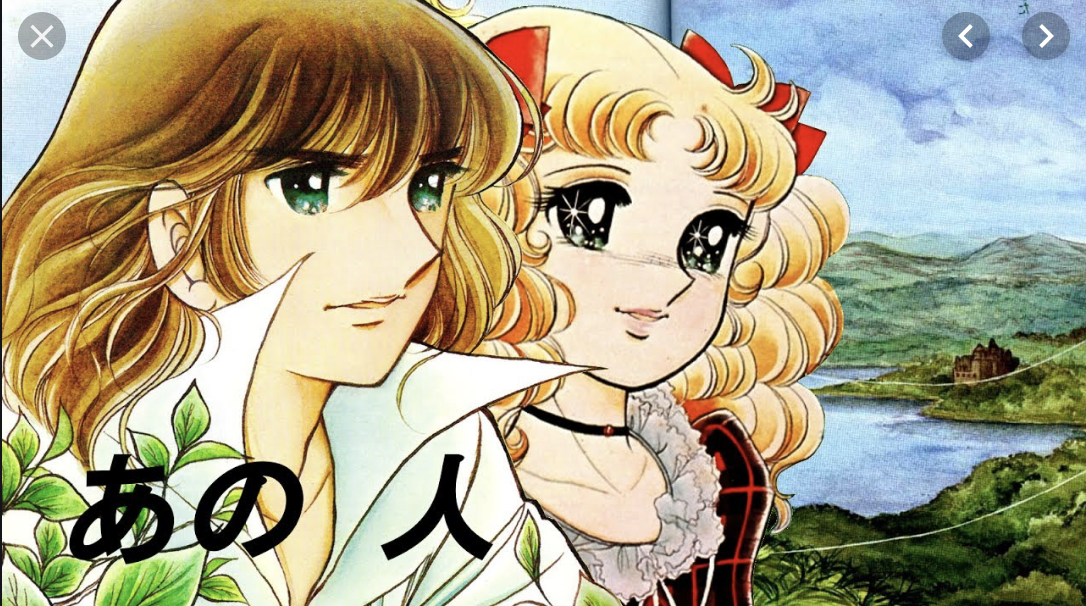
In this installment, CandyNeige.com, France’s biggest and most awesome Candy Candy fan site, share with us their in-depth analysis of why Terry is Anohito in CCFS.
Thank you, CandyNeige!!! And for those of you who wish to visit their webpage, you can go to: http://www.candyneige.com. The site is in both French and English.

CCFS Background
The open ending of the manga had left the fans of the series hungry for more. The series ended simply on the discovery by Candy of the triple identity of Mr. Albert (Great Uncle William, prince of thehill and wanderer), but nothing was unveiled about her future. Was she going to stay at Pony’s home? Would she continue her studies? Would she see Terry again??? Or, as it is sometimes imagined, was she going to live an idyll with Albert (who, incidentally, remains her adoptive father) — an idea that had sprouted in the minds of some people because of the ambiguous ending of the manga that had been imposed onKyoko Mizuki by Kodansha publishers at the time. The hypotheses were therefore limitless!
Many questions remained unanswered, questions that Kyoko Mizuki had eventually answered (partly) in the first novels she wrote in 78, just after the end of the manga. We learned that Candy was a nurse at Pony’s home and that Albert continued his business trips for the Ardlay family. We also discovered that Eleanor Baker, Terry’s mother, had sent Candy an invitation to attend the Hamlet premiere in which Terry was playing. But Candy had refused to go because she did not have the courage to see him again. In return, she had written to Terry but had never sent the letter. In short, we were not much more knowledgeable and Candy’s future was still uncertain. A second Miss Pony!
Fortunately, the publication of Candy Candy Final Story in 2010 (plus the Italian edition in 2014 in Italy and the French edition in 2019), brought new developments and precisions. The format of the novels remains the same; story and exchange of letters, but we also find an older Candy, in her thirties, who remembers with nostalgia the great moments of her life. But the most important thing is that we discover that she is MARRIED and very happy!!!
Bride so, but with whom ????? In short, was it Albert or Terry (or another person)?
The first novels, like the manga, revealed nothing more. Candy’s love life was like the Gobi Desert! What we did know was that she wrote a lot!
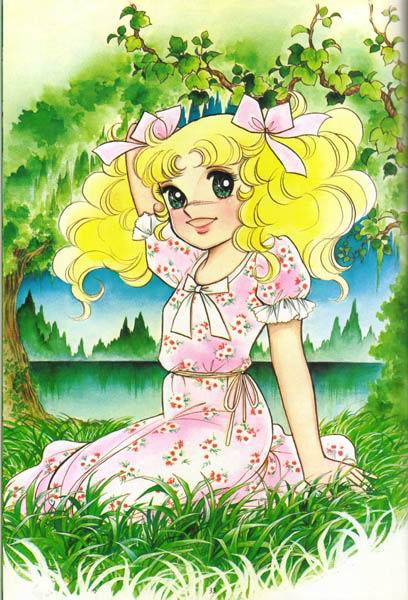
And finally, when you read CCFS, you can let out a sigh of relief. Candy did not finish old maid!
But it was without counting on Keiko Nagita’s fierce wil, to keep the lucky’s one identity secret. Indeed, why reveal the name of this loved one (Anohito) and take the risk of losing and disappointing some of her fans? It was better to preserve this ambiguity, an ambiguity that had allowed this story to resist time and still be in the hearts 40 years later. The pro-Albert and pro-Terry still have good years of squabbling in front of them!
Nevertheless, although the author does not name the man who shares Candy’s life, she sowed many clues, indices that, put end to end, leave no much doubt about his identity. The man in Candy’s life, the one she married and makes her happy seems to be …. (drums rolls) … TERRY !!! Terrence Grandchester, the handsome English aristocrat and everlasting love of our heroine! In a sense, it’s quite logical, but you never know with authors, they like to play with their readers’ nerves.
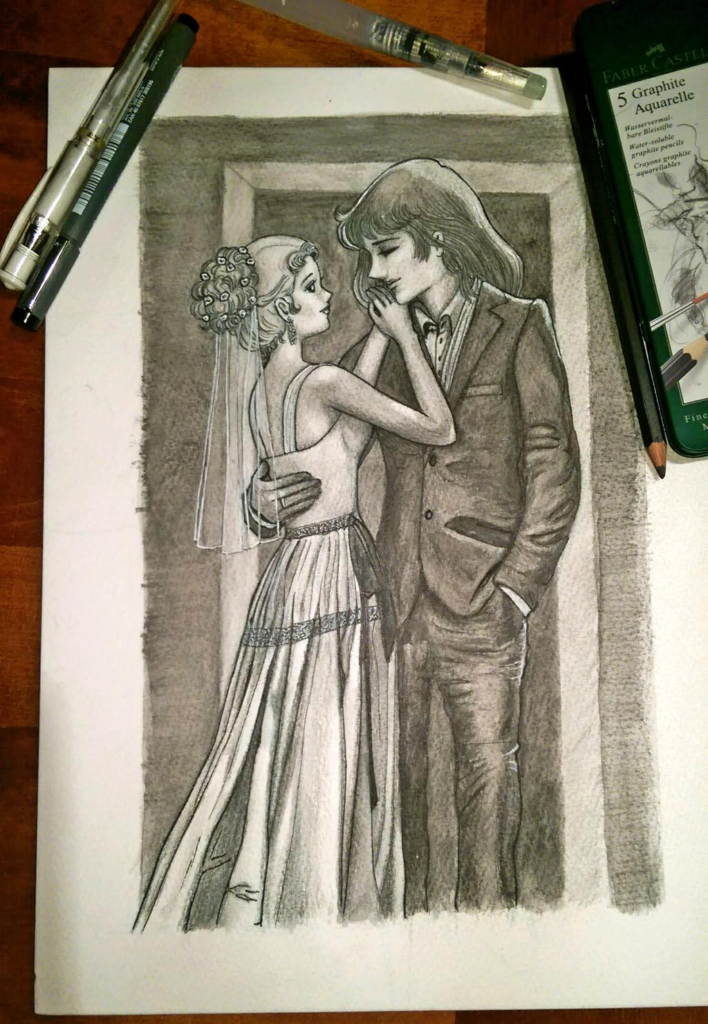

All Roads Lead to Terry
Of course, this result remains subjective since neither Terry’s name nor Albert’s name as Anohito is written in black in the books. But it nevertheless raises many questions and discussions among fans to lead to this conclusion, whose arguments developed below will convince you.

Argument 1 – When is Anohito mentioned for the first time in Candy Candy?
Argument 2 – The jewelry box
Argument 3 – Suzanna’s death
Argument 4 – Terry’s letter
Argument 5 – The painting
Argument 6 – The music box
Argument 7 – Return to the United States as a stowaway
Argument 8 – the symbolism of flowers
Argument 9: The Avon River
Argument 10 – The library in the house of Candy
Argument 11 – Terry’s smile
Argument 12 – Albert versus Terry
Argument 1 – When is Anohito mentioned for the first time in Candy Candy?
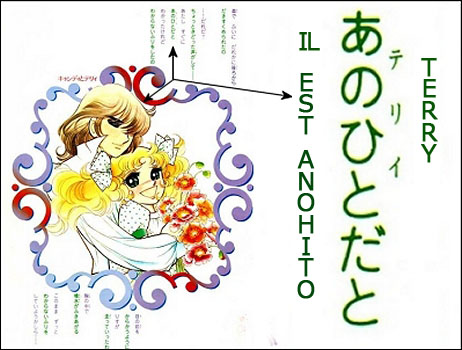
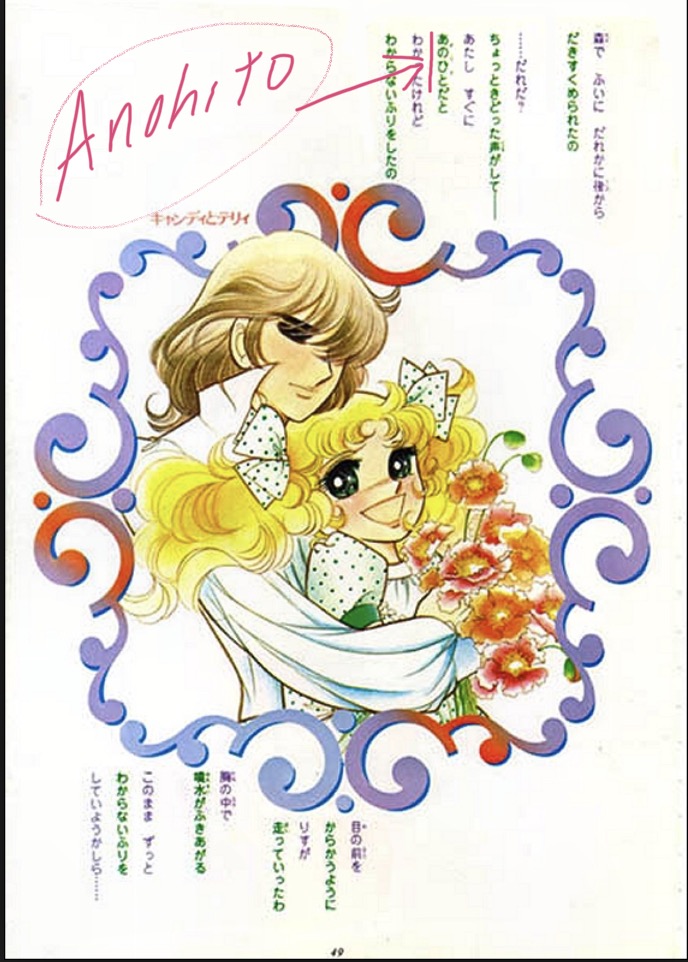
In 77, Keiko Nagita (f/k/a Kyoko Mizuki) was playing with “Anohito”, a Japanese word that means HE, HIM, THAT PERSON, so special and precious to Candy’s heart. This reference to “Anohito/this person” was in a poem that appeared in an illustration by Yumiko Igarashi in her Candy Candy artbook 1.
So here is the poem and its illustration, and the translation of the poem:
森で ふい に だれかに後ろから だきすくめられたの
In the forest, without warning, someone embraced me from behind.・・・だれだ?
. . . Who’s there?ちょっときどった声がして
. . .
I heard a little smug voice . . .— あたし すぐに あのひと (テリィ) だと わかったけれど
Right away, I knew It was Anohito (Terry) who did itわからないふりをしたの
But I pretended to be clueless.目の前を からかうように りすが 走っていったわ
In front of me, squirrels ran about as if they were teasing me.胸の中で 噴水がふきあがる There is a gushing fountain within my chest.
このまま ずっと わからないふりを していようかしら・・・
At this rate, maybe I should pretend to be clueless forever . . . 
Here, too, is the isolated part of the poem that best describes Terry as Anohito.
Terry, aka テ リ ィ in Japanese, is written in smaller size next to あ の ひ と だ と と “It’s Anohito/this person”. This is the first proof that Anohito / this person is Terry!

Argument 2 – The jewelry box
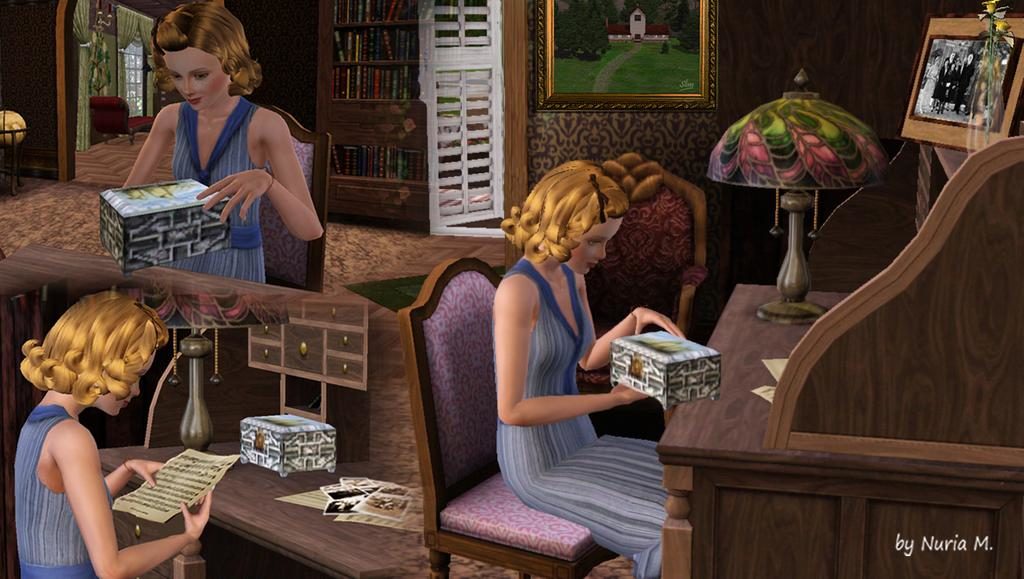
The jewelry box is an important element in the novel because it was offered to Candy by her husband.
From Volume 2, p. 149. (Japanese edition):
小ぶりの宝石とマザーオブパールで装飾されたこの大きな宝石 箱は、 あのひと の家こ代々伝わるものだという。
Adorned with small precious stones and mother-of-pearls, this big jewelry box used to be handed down from generation to generation.
From Volume 2, page 111-112 (Italian edition):
From the bottom of a small wardrobe, I took out a big jewelery box. This voluminous object adorned with mother-of-pearls and small jewels is transmitted from generation to generation in the family of the man I love. I tried to tell him that something as beautiful and valuable like this did not suit me, but he started to laugh and did not give up his intention, telling me that I could do what I wanted with it. This box too luxurious for me to use only contains the things really important to me: my memories. Inside there are clippings of magazines and newspapers as well as a pack of letters. I put the jewelry box on the desk and try to open it . . .
From French edition, page 124, volume 2:
I took the jewelry box out of my chest of drawers and this big box, inlaid with precious stones and mother-of-pearls, was passed down from generation to generation in his family,” he told me.
Without doubt, this passage refers to Terry because the jewelry box is obviously a precious object and very old one, which “is passed from generation to generation in the family”. The heritage of the Grandchester family had been mentioned before, when Candy was in Scotland, in Terry’s mansion.
From Japanese edition, Volume 2, page 83:
テリィの広い別荘は薄暗く、静まり返って いた。 廊下のいたるところに今にも動き出しそうな甲胃や剣が飾られてある。グランチェスター家 先祖代々の崎しい肖像画。
“The ancestral family of the Grandchester / the austere portraits of ancestors.”「グランチェスター家先祖代々の厳し い 肖像画。」
「先祖代々」= senzodaidai: ancestral; hereditary; from generation to generation; who passes from father to son「代々」.
“Terry’s spacious villa was dark and silent, along the corridor were lined with armor, which seemed to come alive at any moment, as well as the severe portraits of Granchester’s ancestors from generation to generation . . . ” (MissEdda’s translation) ”or Terry’s spacious villa was dark and silent, along the corridor were lined with armor, which seemed to come alive at any moment, as well as the severe portraits of the ancestors from the beginning of the Granchester house to today . . . ” (MissEdda’s translation)
Italian translation:
”The austere portraits of the ancestors of the Grandchester family were hanging on the walls, from generation to generation.” (Alle pareti erano appesi I severi ritratti degli antenati dei Granchester, generazione dopo generazione. )
Strangely, in the French translation, the end of sentence “from generation to generation” does not appear. Once is not custom, each additional clue in favor of Terry is removed.
As a proof : (French translation, page 70, volume 2):
“Terry’s second home was large and silent, the corridors were decorated with armor, helmets and sabers that seemed to move, and majestic portraits of Granchester ancestors were also hanging on the walls.”
Where is the end of sentence “from generation to generation”???? Truly, how absent-minded Pika’s translator is when it comes to Terry! … Indeed, if these words “from generation to generation” had been preserved and not deleted, the link would have been quickly made with the music box!
“Adorned with small precious stones and mother-of-pearls, this big jewelery box would be handed down from generation to generation .”
(Volume 2, page 149, original text).
Fortunately, there are other translations to prove it! Terry’s family was a family of the greatest and longest nobility, who necessarily possesses some precious objects that are kept in the family for their historical and symbolic value. Terry was the eldest son of the Duke of Grandchester, he would become a Duke in his turn on his father’s death. It was therefore normal that this kind of object would come down to him. Moreover, it is not surprising that Candy reacted this way in front of such an object which symbolically represented a lot of things for her, and mainly the fact of belonging to this ancient noble lineage, which for her was in total contrast with her modest origins. Like when she was adopted by the Ardlay family, Candy’s deep feeling was not to really be part of it. All her life, she would remain in her heart the little orphan of Pony’s home. That was why Terry played the situation down and told her to do what she wanted with it.
This music box could not in any case belong to Albert because his family in Scotland was a family of farmers. Albert described them to Candy as being a family of bumps, which is not very laudatory from him!
“だいたい先祖のウイリアム・アードレーなんてスコットランドのいなかもんだつたんだよ。” My ancestor, William Ardlay was a Scottish bumpkin.”
— page 171, volume 3 of the 1979 novels.
It was this great-grandfather who left his Scottish countryside for the United States where he built his fortune. It would be excessive to want to connect Albert’s family, whose fortune dated back to only two or three generations, to this object, which according to its description is a very ancient and precious object, and which belonged to the family for several centuries. I invite you to visit the following link about jewel boxes which is more than elusive: old jewel boxes, boxes and travel kits. (Links to come.)

Argument 3 – Suzanna’s death
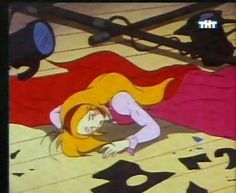
Suzanna Marlowe is certainly (with Eliza), the most hated character by Candy and Terry’s fans. But we still have to be fairplay with her because if she had not sacrificed herself, Terry would have ended up in her place under the spotlight, so let’s give credit when credit is due. Nevertheless, with this gesture, Terry felt indebted, and his honor required him to stay with her. Anyway, even turning the story in all directions, it is obvious that if Terry and Candy had stayed together, Suzanna’s case would have ruined their lives, the guilt would have poisoned their relationship and they would have necessarily separated. So, it was written. Terry had to stay with Suzanna even if it meant that he had to give up Candy.
In the manga but also in CCFS (Candy Candy Final Story), we know that Candy and Terry saw each other after their separation. This happened in Rockstown in a traveling theater where Terry, turned alcoholic, gave performances in front of a public of drunkards. Candy was desperate when she saw the state of decay into which he has fallen. Fortunately, when he saw Candy’s sad look, his courage came back to him and he decided to rejoin his old company, but also to go back to Suzanna to not fail his promise.

Later, Candy met Terry’s mother who thanked her for helping her son to recover.”
“I doubt that he really saw me,” said Candy, “I do not think he could distinguish me in the dim light of this theater.”
“No, he must have recognized you otherwise he probably would never have been able to do such a performance . . . And even though he did not really recognize you, he must have understood that the person he really loved was you . . . I can understand it, I’m his mother. ”
– Excerpt from the manga, volume 9, page 128.
After this most moving exchange, Candy went home, alone and without Terry!
The three novels published in 1977/1978 did not bring more details. We knew that Terry had returned to Suzanna, that Candy had written a letter to him without ever sending it because she had forbidden herself to get in touch with him, having made the promise to Suzanna to stay away from their lives. What strange character indeed was that Suzanna, so demanding towards others and unable to fight against her own? How could she look at herself in the mirror each morning when seeing the man she loved to wither a little more each day, with as only excuse the passionate love (let’s say rather possessive) that she felt for him? We also learn in CCFS that she had hidden most of the letters that Candy had sent to Terry before their separation.
So we were there: Candy alone at Pony’s home, writing to Terry who was stuck with that dead weight Suzanna. And yet, Volume 2 of Final Story came to upset the situation with the sudden announcement and just as unexpected of Suzanna’s death! Yes, the-chipie-who-stole-Terry-to-Candy had given up the ghost after a long illness! Incredible and yet true!
It has been many years since I read Susanna’s death in an article, and these words, which I read only once, remain etched in my mind.
Susanna was dead . . .
At that moment, I had slumped on the couch, empty of all energy. I gasped and could not stop crying.
In the newspaper there was a photo of Susanna, smiling and sitting in a wheelchair. It was written that she worked as a narrator and composer of music for the theater, some of which had even been used on stage. It was well known that she was related to Terrence Graham and had always lived with him fighting the disease. However, their engagement never turned into marriage.
There was no statement from Terrence.
— Volume 2, page 206, Italian edition.
Then one day I read a newspaper article announcing the death of Susanna Marlowe. Many years ago. This article, I read it only once, but I do not need to read it again to have the slightest word engraved in me.
Susanna is dead . . .
At the time, I no longer felt any strength and I dropped on the couch. I could not breathe, my tears flowed without stopping.
The article was accompanied by a photograph of Susanna, smiling, in a wheelchair. Susanna had continued her career in the theater, only in the roles of narrator and voiceover. She had also written various plays, many of which had been edited and played, the article said. The famous Terence Graham, his friend, had lived with her and supported her to the end in her fight against the disease. Nevertheless, they had never been married, it still told.
No statement from Terence.
— French translation, tome 2, page 225-226
Equal to herself, Candy was devastated by the news. She was obviously unaware that Suzanna was sick. Confused thoughts must mix in her mind, painful memories too. For love, she had entrusted Terry to Suzanna, convinced that it was the only way for him to be happy. And what did she learn? They were betrothed but did not get married. Yet many years (around ten) have passed since their own breakup. Maybe it was impossible for Terry to move on to the next step, which meant giving up Candy, his big love, forever? Maybe it was just the disease that made this union impossible? The assumptions are many, but one thing is certain, Keiko Nagita imagining Suzanna’s death gave his freedom back to Terry and offered him an highway to find Candy!
Note: The evocation of the engagement between Susanna and Terry appears in the original Japanese CCFS and in the Italian translated edition, but “surprisingly”, not in the French translated edition . . .
しかしスザナはテリュースと婚約したまま結婚することはなかったという。
— Volume 2, page 281

Argument 4 – Terry’s letter
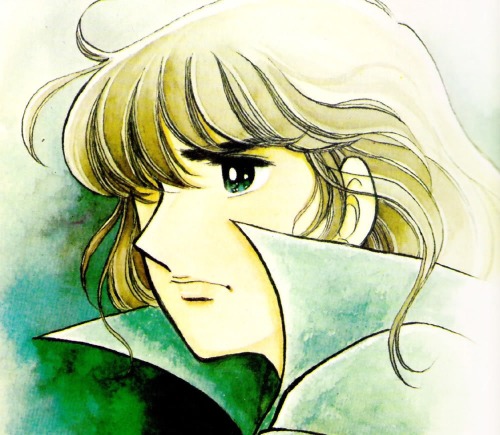
From CCFS, page 283, Volume 2:
Dear Candy,
How are you ?
A year has passed since then . . . After that, I promised myself to write you but beset by doubt, I let another six months pass. But now I find the courage to send you this letter.
Nothing has changed for me.
I do not know if these words will come to you, but I wanted you to know at least these.
— TG
This letter, which did not exist in the previous 1978 edition of the CC novels, was present on page 283 of Volume 2 of Final Story, and on page 207 of the Italian translation. It appears after the discovery of Suzanna’s death by Candy. As noted above, Terry was now free to contact Candy. But as he was a gentleman, he waited a year, which was the time of mourning when a husband lost his wife (three years for a widow . . . Triple penalty!). Although Terry and Suzanna have never married, it is not surprising he waited given the latter’s nobility of heart and education that he mourned for a year. After this period, he felt more comfortable to contact Candy. But this time, the doubt invaded him because he knew nothing about her feelings, and he obviously did not know that she still lived at Pony’s home. But he wanted her to know that nothing had changed for him, which in Terry’s language meant that his feelings had not changed. In fact, that he still loved her.
We understand then that he hesitated another six months to write to her because the guy was not one to indulge feelings. He was also afraid that she might reject him because many years had passed since their separation. He did not know what had become of her and if she still loved him. That was why he used the word “courage” that made sense in his situation. What a risk taken on his behalf but what an evidence of love too! The content of the letter, rather terse, was a new demonstration of the love he had for her. Terry was very modest in his feelings and it was always difficult for him to reveal himself.
Just as in the letter he left to Candy on leaving St Paul (chapter 17, volume 2, CCFS), he reduced to the essential all his words, not without addressing her a few tender words.
From manga “Candy Candy”, volume 4, Kodansha edition:
Dear Candy,
I decided to leave school and go to America. There is one thing I would like to do. Wherever I am, I will always pray for your happiness.
— Terrence
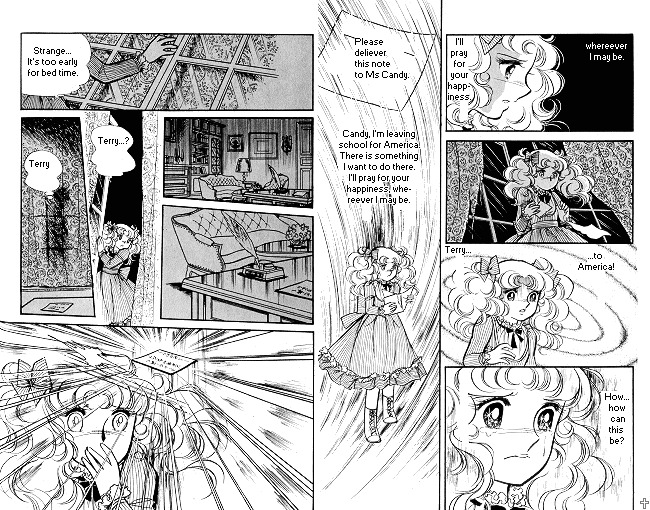
So we can not blame Terry for lack of language because it was in his nature to be like that. He was a modesty being, so much so that when one reads his attempt to be more explicit in his feelings (in the letter he sends after Suzanna’s death), they are tenfold in strength. One can imagine the dozens of drafts he had to write before being satisfied with his letter, and the many attempts before he could send it. He had to breath a lot when he dropped it at the Post Office.
One might wonder why Candy’s answer does not appear in the book. The reason to this is the simple logic: if there was a letter from Candy, it’s Terry who owned it. QED! We know that Candy kept her mail in her jewelry box. In this box are Terry’s letters as well as those she did not send to him because she refrained from contacting him because ofSuzanna. (See Letter to Eleonore Baker). Certainly Candy had answered Terry (to join or reject him, opposite viewpoint depending on everyone’s preference, but she could not have left him in the dark). And so, if there was a letter, it was in Terry’s hands like all the others she’d sent him and that had managed to get through the web of the selfish Suzanna.
Once again, why would Nagita take the trouble to kill Suzanna and haveTerry write Candy if it’s not to get them together? What’s the point in adding all this in the Final Story when she could have contented herself with keeping the previous version in which these new events were not? Keiko Nagita is not a sneaky person. She loves her readers, and even more her characters.
Note: The content of Volume 2 in French deeply shocked all those who read the translations in other languages. Indeed, in the French version, Terry’s letter appears without emotion, some important words and phrases have been removed to visibly agree with the pro-Albert vision of the translator and Pika. Doubt was allowed at first despite the already very ambiguous title chosen for Volume 2, but this is now obvious reading this completely distorted version that has nothing todo with the original, nor with the official Italian version The Proof is here as provided by Pika’s version, page 228, Volume 2:
Candy, Always the same ? . . . A year has passed. I told myself that I will contact you after one year. But by dint of hesitation, six more months have passed. Go, I’m writing to you, and come what may. I am always the same. TG .
Why the soul and the poetry of this letter disappeared in this translation? Why is it so far away from the other translations that are very close??? Why is missing “since then” after “One year has passed”? This word “since then” makes a lot of sense since Terry’s letter appears right after the announcement of Suzanne’s death! What is this “Go, I write to you, and come what may”??? in comparison to “I decided and now I put this letter in the mail box.” in the Japanese version, and “Now, however, I took my courage and decided to send you this letter.” in the Italian version .
What casualness!!! Terry would never have addressed Candy with such familiarity! He was here in his thirties and he behaved like an eternal teen, with rap music in background! It was edifying ignorance but also disrespect for Keiko Nagita and her characters! Terry, the one who sacrificed himself for Candy and who asked to be fired from St Paul instead of her, the one who before going to NY first went to Pony’s home to see the childhood home of the one he loved, the one who had been looking for her in Chicago all night, the one who sent her a one-way ticket to join him in NY, the one who was crying loudly at the time of their separation, the one who gave up his career and fell into alcoholism as his grief was so big to have lost her, how that one, then, could have sent a letter as pitiful to Candy, the one he never forgot and still loved???? Where is the meaning in all this with regard to this pathetic translation???
And what about this missing phrase “I’m not sure this letter will come to you but I wanted you to know it.” Japanese version, and “I do not know if you’ll get those words, but I wanted you to know it at least.” Italian version. Simply REMOVED! Why ????? Keiko Nagita wrote a book full of poetry, her style is refined, sophisticated, a hundred leagues away from this simplistic and soulless translation, which suggests that Nagita would be a bad writer. However, in the Italian version, poetry and aesthetics are preserved. The meaning of words and phrases is preserved in contrast to this version which is a real disappointment both in style and in form since the translator did not hesitate to modify the text and especially its meaning!
All this testifies to one thing, obvious: Manipulating the text to prove that Terry is not Anohito! What is the interest to modify at this point all that refers to him if Anohito was Albert? There was only to be guided by the text. “Unfortunately,” Anohito is Terry, and to suggest that it is not him, he denatured and truncated his letter. Appalling!
Fortunately, by searching on the internet, it is easy to find translations of Japanese and Italian versions and compare. The result is unequivocal! The French text does not respect the original text and grants itself freedoms of interpretation which are not justified and which deserve to be challenged and denounced. It is not a question here of nuances in the translation, but of a real manipulation of the text, which leads us to wonder about the editorial choice of a publishing company yet famous like Pika . . .

Argument 5 – The painting

At the beginning of CCFS Volume 1, Candy was an adult and married. She was walking in her house, her eyes rested on an oil painting about fifty centimeters wide that represents a panoramic view of Pony’s home, from the top of the hill. HE gave it (the painting) to her after discovering it at a flea market in London.
We also learn that this oil painting was made by Slim, one of the children of the orphanage, the one who always made bedwetting. Slim was an artist, he loved to paint. Then he was adopted by a blacksmith, but on discovering this painting, Candy was relieved to see that he had continued to paint.
Two hypotheses oppose each other. Albert and Terry both knew Pony’s Hill, but the one we’re sure he had been looking at Pony’s House from the top of the hill is Terry. Indeed, it was Terry who, when he returned to America, made a detour by Pony’s home and went up to the hill to observe the point of view. Candy had told him so often about this hill, he knew how much it meant to her, and for him, getting on the hill was like getting closer to Candy, knowing her thoughts, feeling her emotions.
I remember this time when you told me that you would have liked to see the place I grew up in. In the same way, I remember your smile. Thank you for your visit . . . I know you’ve been there for a short time, but the directors told me that you went to see the big oak on which I used to climb, the apple tree where I learned to launch the lasso and Pony’s hill . Those trees that you may have touched and the hill on which you stopped , are now even more precious to me.
—Volume 2, page 128, Italian translation
You said that you would like to visit the house where I grew up, one day, I remember, I still have your smile in front of me, the day you said it, and you did it! Thank you for coming, Terry … Too bad you stayed so little … Miss Pony and Sister Lane told me that you had looked at the big oak I used to climb all the time, the apple tree on which I was Lasso training, and Pony ‘sHill, the trees you touched, the hill where you climbed … It makes these places even more important to me.
— Page 143, volume 2, French translation.

In the book, we know that Albert, when he was the prince, and when he returned to the house Pony as William Ardlay, went to the hill. We know that he laid down in the grass and looked at the sky, but there was no indication that he observed this point of view as it was indicated for Terry in the manga. The balance, in terms of descriptions, leans more here in favor of Terry.
Albert:
Lying in the grass, the sky seemed to me immense and it seemed to me to be sucked in by that blue. Nice white clouds moved pleasantly, carried by the wind, I envied them for their freedom.
— Page 221, Volume 2, Italian translation.
I lay down in the grass, the sky was so high … I felt myself absorbed in the blue, the clouds, with their pleasing forms, were flowing … They are free, them …
— Page 241, volume 2, French translation.
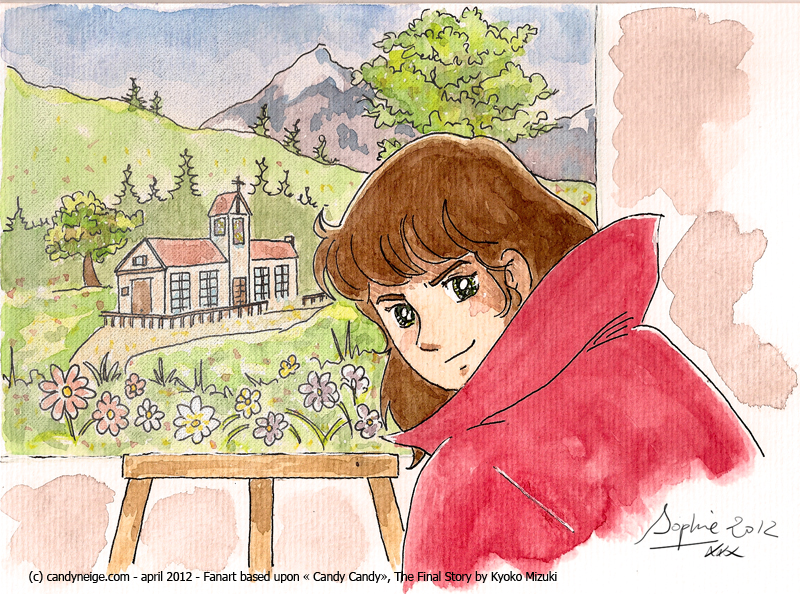

Argument 6 – The Music Box
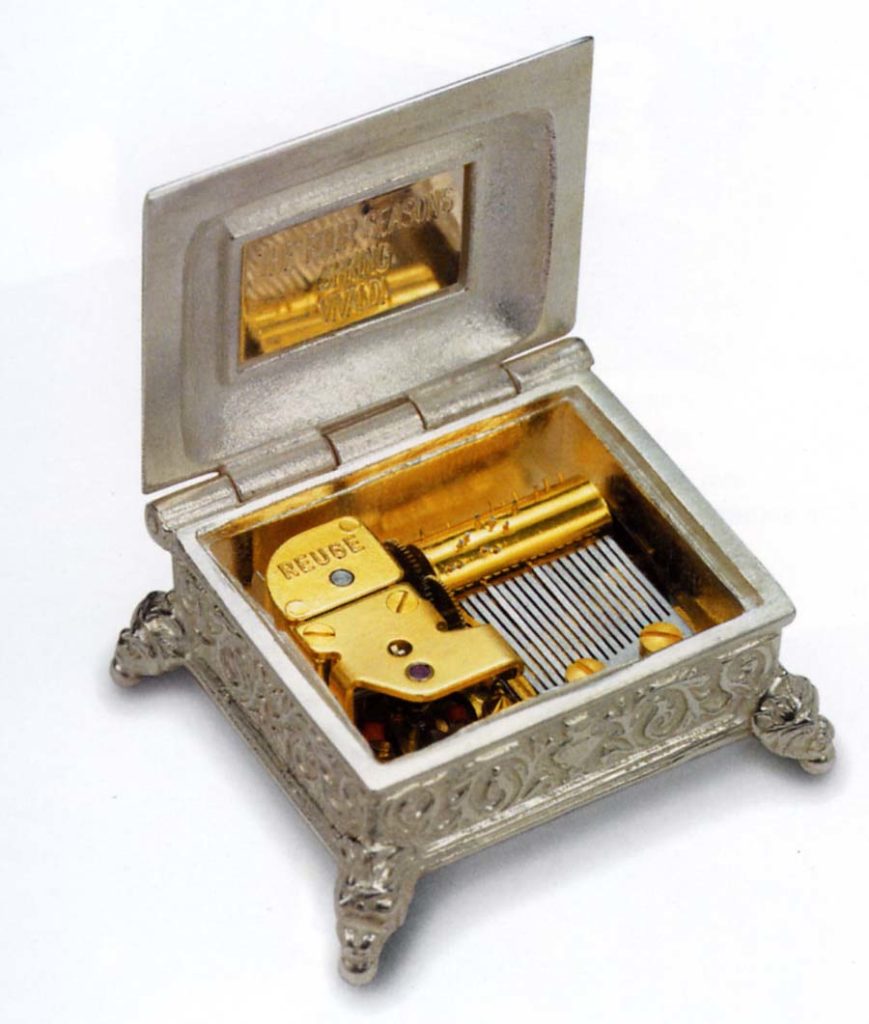
Analysis of this clue perfectly championed and developed by Scottie, translation from English by our forum member Sunnyrainbow:
Terry’s pack of letters, press clippings of plays, with good and bad reviews, everything about Terry, everything is included, and with that the small and precious music box . . .
From Vol. II, page 197, Japanese version:
I pulled out a thick envelope from the jewelry box, there were clippings in it, and since then I’ve been carrying those cuts with me everywhere for a long time, and they’re old enough. Always a very clear picture of Terry’s elegant silhouette in my mind.
From Volume II, pages 186-188.
Terry’s clippings are next to the happiness box.
This accessory in the novel is important to give an identity to Anohito. Because we know that Anohito repaired the little box to happiness.
On that foggy morning, when I left for New York, Stair offered me the carillon of Candy’s happiness, saying, “Every time you make it ring, you will come closer and closer to happiness. ”
You were right Stair, in that snowy night you saved me. Without this serene and joyful music, I do not even know if I would have been able to return to Chicago. Since that day, every time I felt sad, I listened to his melody, so often that one day it broke. I was so dejected that I almost seemed to have lost the last thing that kept me tied to my friend, but some time later, HE easily managed to fix it. Since then I have always been afraid that it will break again, so I have placed it safely as a precious object.”
— Volume 2, page 174-178, Italian version.
At first glance, you might think it was Albert when you remember that in the manga he repaired Alistair’s swan boat in Lakewood, and that being an inveterate traveler, he probably learned a lot of things to survive and to remain independent.
On the other hand, one only has to think of Terry’s hands that were complimented by Alistair in the manga. Alistair even invited him to help him make his inventions just before Terry left the College to protect Candy. In the novel, Candy also referred to Terry’s great ability to play the piano and make fire.
The key lies in the symbolism of the little happiness box. It was a gift from Alistair to Candy before she joined Terry in New York, so it’s a symbol of happiness in Candy’s life. It’s intimately related toTerry who represents Candy’s happiness. But the little happiness box broke after Candy and Terry’s separation.This box represented the painful break of these two characters. That the box no longer played music should be understood as the consequence of the separation and deep emotional pain of this event. The broken music box was Candy’s broken heart, so only Terry could repair the music box! Anohito repaired the music box. The fact that the repair was made by Terry, as Anohito, gives more weight than a banal repair. It symbolized Candy’s heart. With a conclusion that Anohito/Terry repaired the box, it shows how Candy’s heart healed from her old wounds. The repair of the little happiness box represented the beginning of a new road filled with joy and hope for Candy.
This is not only to demonstrate the skill of someone who repaired an invention of Alistair; no, it was the author who invited us to read in depth and discover the symbolism of objects. The broken music box is the pain caused by the breakup of Candy and Terry. Such symbols of love and pain used by the author indicate that history has always had this intention. It is a constant reformulation of the love between these two characters.
Note: The French translation by Pika is distinguished once again by the liberties and the risky interpretations of their translator as how they translated this part of Candy’s retrospection:
Subsequently, I had so much recourse to my little happiness machine, every time a drama happened to me, that the mechanism finally broke, I was sorry. The last link that held me to Stair had just been broken, and luckily, a few days later, someone who would become dearer and dearer to me repaired it . . .
— Page 194, Volume 2.
The original Japanese version, page 238, Volume 2, is as follows:
ステアとのつながりが切れたような気がして,打ちひしがれていたが,それを後日,いとも簡単にあのひとは 修理 し て く れ た た た.
Vol 2, pg 238.
Since that day, every time I felt sad, I was listening to that melody, until one day it broke, I was so devastated, it felt like I had lost the last thing which connected me to my friend, but soon after, my other half repaired it very easily, since then I have always been afraid that it will break again, so I put it in a safe place like a precious object .
So, in French, “my half” became “someone who should become dearer and dearer to me.” How strange it is! . . .
The problem here, again, is that this “interpretation” or “distortion” by Pika in trying to guide the readers to someone other than Terry. Because this “someone who would become dearer and dearer to me” here suggested a rising love that is increasing, whereas if it were about Terry, there would be no need to specify that since the we know that Candy loved Terry since St Paul. So where is it in the original text???
This is therefore a new proof that the French translator has tried to falsify the truth by transforming the text so that the reader no longer thinks of Terry but Albert, (or an illustrious unknown). So you have to eliminate Terry from the threesome! That’s not very nice all that!

Argument 7 – Return to the United States as a stowaway
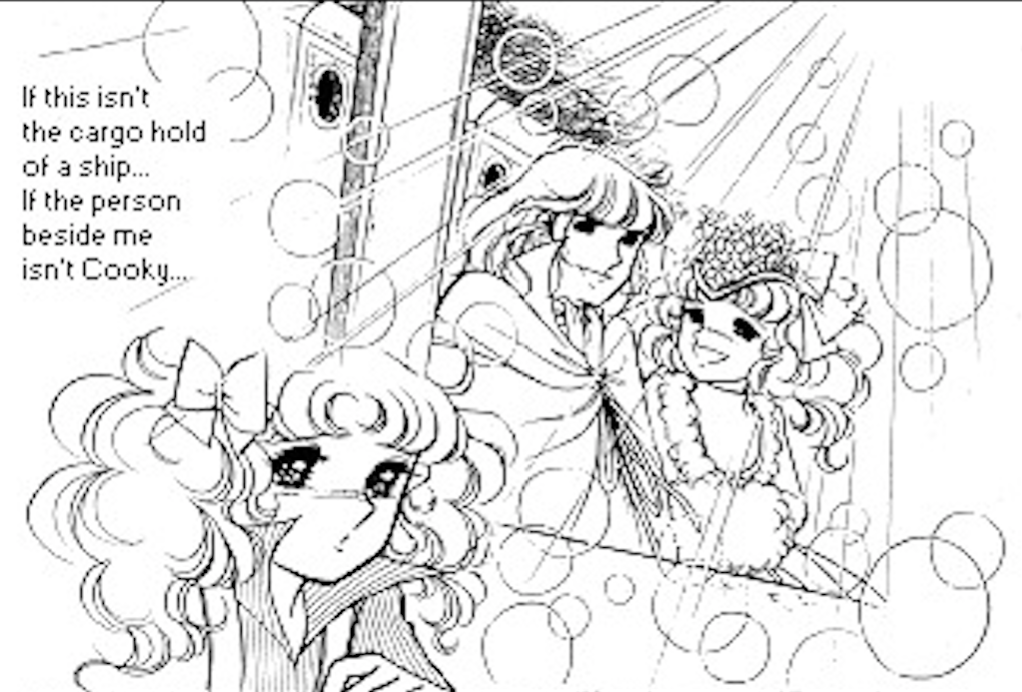
America and England . . .
I knew that between the two nations there was an immense ocean, but at that moment, in my heart, there was no place for doubts; I will be back home and I will see Terry again. When I told him all the events that made my trip to America, he laughed at first, then suddenly he showed a serious expression and he hugged me tightly. He was relieved that nothing bad happened to me. Indeed, my actions could be defined as inconsiderate.
— Volume 2, page 111, Italian version.
When I told him what had happened on this trip back to America, the one who listened to me started laughing, finding it very amusing, then he suddenly became serious and hugged me very hard in his arms.
“You’re lucky that nothing bad happened to you.”
. . . That’s right, what an imprudent I was . . .
— Page 123, Volume 2, French translation.
I thought for a long time that Candy had told Terry the conditions of her return to America. Indeed, that would have been the first thing she could have told him when they saw each other in New York. However, reading the letter she wrote to him after their breakup, we discover that she did not dare to do so because she felt him very upset.
You do not know how many adventures I’ve faced to get to America and find you, I wish I could have told you all that calmly, but in the end it was not possible.
— Letter to Terrence Graham, page 203, Volume 2, Italian version.
Terry, I wanted so much to tell you how I came back to America to get you, but the time to find you, it was not the moment to narrate my adventures . . .
— Page 220, volume 2 , French translation.
So we can easily conclude here that it was when she saw Terry again that she could finally tell him about her journey back to America because she did not have the opportunity in New York, and that she did not send him the letter in which she told him about it. It certainly could not be Albert because we do not forget that they lived together in the Magnolias house and that she had the opportunity to talk to him about Terry all the way through.
In other words, Mr. Albert knows almost as well as I do, my feelings for you, he knows everything about our first meeting and how, over time … in short, he knows everything.
— Volume 2, page 204, Italian version.
It’s hard to imagine Candy failing to tell him that great moment of her life that brought her a little closer every day to Terry. As we imagine Terry, sighing with relief as he heard this story. He never had to fend for himself. Life, in material terms, had always been simpler for him. And we imagine quite well, his chills of anxiety as he thought about her on a boat with sailors who have not seen a woman for weeks. We are trembling for her! In addition, he squeezed her hard against him, which showed a much more intimate gesture but also the deep concern he felt. And it would be impossible for Albert to hug Candy tightly, or even hug her at the Magnolia House era. Although living together, they physically kept a certain distance. Moreover, we notice in the manga, that Candy was the one who is the most “touchy” between the two, like a little girl with her big brother or her dad. These were always childish attitudes, nothing to do with the tender gestures and game of gazes that she exchanged with Terry.

Argument 8 – the symbolism of flowers

Keiko Nagita likes to use symbols to characterize her characters, including flowers.
Anthony = the rose
Albert = There is really no link with a flower for Albert. By insisting a little, we can attribute to him the magnolia flower (in reference to the house where he lived with Candy)
Terry = the daffodil
This symbolism of flowers recurs in the text repeatedly. So when Candy, adult, remembers Anthony’s death:
In order to calm myself, I went out to the big terrace and the Avon River, under the light of early spring, was quietly following its course. The fresh wind from the river was able to soothe the ebb and flow of the emotions that the perfume of the daffodils was spreading in the garden, I took a deep breath to let me through the sweet scent. There were so many daffodils that a golden light seemed to sneak between the trees of the garden.
— Volume 1, page 200, French translation
I just stumbled, you should not lie on the floor, where no one can see you, you’re not a rock! - The stones do not smell the scent of daffodils.
— Volume 1, page 275, French translation.
And then, this event that I personally experienced with Keiko Nagita that I tell on the VIP meeting page and that confirms that the daffodil is Terry’s symbol:
Mehdi Benrabah, the editorial leader of Pika Editions, a kind rugby-rugged person, came to us and asked if anyone wanted to go into the next room to meet the author. Nobody seemed determined to go first, so I got up, provided with my bouquet of daffodils and my book, then walked around the partition. Keiko Nagita was waiting for me in the living room “Library”, sitting behind a table with her translator. I smiled, greeted her and handed her the bouquet. She first displayed an expression of surprise, then seizing the bouquet, she cried: “TERRY !!!!”
I was in my turn suffocated by the surprise, because I did not expect that she expresses so openly this symbol which binds these flowers to our beautiful aristocrat. While she sat down and handed the bouquet to her daughter, her translator whispered to me that she was very touched because “these flowers had a very special meaning for her because they were related to the story.” I was moved and touched in my turn.
[The full recount of the above meeting is also on this website here.]
The symbolism of the daffodils is thus very important in the story of Candy that Keiko Nagita connects each time to Terry. Daffodils in bloom are everywhere around the house. It is therefore worth wondering why Candy would live in a house that reminds her so much of Terry if she was not living with him. Why would you want to torture yourself in a place that would always remind you of the person she loved so much. See for example her diary where she described her feelings for Terry:
Although I can write, I can not express the feeling I feel for Terry. TG left leaving me a lot of memories . . . But I do not want to talk about memories and the fact that he left, because one day we will meet again! TG, until that moment comes, I will continue to nurture and take care of the feelings I feel for you.
However, TG, I hope you will not get angry. You tried to protect me by sacrificing yourself for me, but I’m about to leave school. I feel that I will not find my way if I stay here, I am aware that I am securing myself a future, but I have realized that this will not lead me to happiness. I have to find my way alone, and if there is someone who taught me, it’s you TG, thank you! And then, I would have liked to cry aloud to you: Terrence, I am in love with you, as I have never been for anyone . . .
— Page 106, Volume 2, Italian translation.
Terence, I love you , I love you more than anyone.
— Page 117, volume 2, French translation

Argument 9: The Avon River

In order to calm myself, I went out on the big terrace and the Avon River, under the light of early spring, was quietly following its course. The fresh wind from the river was able to soothe the ebb and flow of the emotions that the perfume of the daffodils was spreading in the garden. I took a deep breath to let me through the sweet scent. There were so many daffodils that a golden light seemed to sneak between the trees of the garden.
— Volume 1, page 200, French translation .
There are several rivers with the name of Avon flowing in England. Nevertheless, we will be interested in one in particular, and this for two reasons. The first one is that this river is in Warwickshire which, as if by chance, flows through Stratford-upon-Avon, the city where Shakespeare was born and lived. Needless to say, Shakespeare is unquestionably linked to Terry and not to Albert. The second reason is that Keiko Nagita, during her visit to Paris, confirmed that it was the city of Stratford-Upon-Avon to which she referred in her book. Proof of this is with the video made by members of the Nagita Fans group.
Here’s what she answered to the question about the reason for the daffodils in her book:
Why the daffodils?” It was the poem of an English poet, Wordsworth. The violets evoked Shakespeare, but the day I visited Stratford, the daffodils were in bloom, Stratford, the village of Shakespeare. I think of an English flower, daffodils come straight to my mind, Wordsworth wrote a poem about daffodils, you’ve heard about it, it’s a famous poem, I love daffodils!
This brings us to the following question: Why would Candy want to live in a Shakespeare town, which is Terry’s town, and in a house surrounded by daffodils, the symbol of Terry, if she was married to someone else?
Why, assuming Albert was Anohito, would he choose to live in a place where Terry’s ghost would roam everywhere? Not to mention that Stratford-Upon-Avon is the home to the Royal Shakespeare Company Theater, which increases the chances of Terry being part of the troupe.
After, of course, if one’s want to pick holes to prove the opposite, there are dozens of Avon rivers around the world, Canada, Australia, New Zealand, there are even three in France! Good luck !

Argument 10 – The library in the house of Candy

After closing the box, I breathe deeply and to try to recover I head for the room next door for study.
The walls of this room are covered with leather bound books: the complete works of Shakespeare, novels of French and English literature, medical publications.
— Volume 2, page 146-149, Italian version.
This room is the library-desk and its walls are covered with books on their shelves: complete works by Shakespeare, anthologies of French and English literature, collections of medical books.
Page 161-162, Volume 2, French translation.
This is the description of Candy’s library in her current home, the one where she lives with Anohito/this person. We know that Terry was a fervent admirer of Shakespeare, and as if by chance, the complete works of this author appears in Candy’s library. We know that Terry had the complete series in the following passage:
Terry laid a hand on the door surrounded by different books.
“Terry, these are all theatrical texts! There are also all the works of Shakespeare!”
“But yes . . . “
The boy stopped and took one of the volumes, but rested it a moment later. Before leaving, her mother, Eleonor Baker, had suggested that he goes with her to America to study drama. She might have felt deep in her heart that her son had a deep interest in this world. “
— Chapter 14, Volume 2, Italian translation.
Hey, Terry, there’s a lot of plays here, I recognize the complete works of Shakespeare.
— Page 76, chapter 14, volume 2, French translation.
But we also know that he read them!
Terry lifted the bulky book he had with him and then lightly hit Candy’s head, actually coming to wait for the girl to come in. He tried with all his strength to hold back the muscles in his face. were ready to relax in an uncontrollable smile.
“But look at it . . . So you’re a great reader, even if you do not see it.” Regaining her composure, Candy glanced at Terry’s book.
“What’s that talking about?”“This is Shakespeare.” The boy handed her the volume, a heavy dark brown leather cover binding it.
“Shakespeare . . . ah, yes! Whoever wrote Romeo and Juliet!” she said candidly. The two young people looked away at the same time. Candy realized that Terry had also remembered the May Festival and she started flipping through the book to hide her embarrassment.
— Chapter 13, Volume 2, Italian translation.
“Oh yes, do you like to read? You do not show it yet,” explained Candy, glancing at the book. “What is it?”
“Shakespeare.” Terry handed her a thick volume with dark brown leather cover.
“Shakespeare, the author of Romeo and Juliet, is that right?” This title had escaped her. Both looked away immediately. At this reaction, Candy realized that Terry had not forgotten the day of May Day . . .
— Page 57, chapter 13, volume 2, French translation.
Not only had Terry read Shakespeare and become passionate about this author, but both realized the bond that united them through him. Was it not at the May Festival, when they were disguised as Romeo and Juliet, that they exchanged their first kiss? (in the manga) This scene is very symbolic of the feelings of love they felt for each other and it made them feel awkward. Automatically, any reference to Shakespeare appeals to them as a couple. Why would Candy keep in her library the complete work of this author who would remind her every time of her lost love? For pure masochism? And if she were married to Albert, how could he keep these books in his house, let alone in his library, knowing full well that his wife could not help but sigh before?
I remembered the words he had left me before leaving, the same way I had not forgotten the commitment with which he had read and recited the tragedies of Shakespeare in Scotland.
— Volume 2, page 137, Italian translation.
In addition to Shakespeare’s books, there is a library of medical, French and English books. No travel books, or about animals, no law books, or finance ones. Nothing that recalls Albert’s activities and interests. All in all, if, with a lot of imagination, we persist in wanting to consider that this is the description of the library of Candy and Albert, we must also accept the fact that the poor guy had no other choice than being stuck with the books of his wife’s former lover, and the books of medicine of this last one, which would annoy any spouse normally constituted.

Argument 11 – Terry’s smile
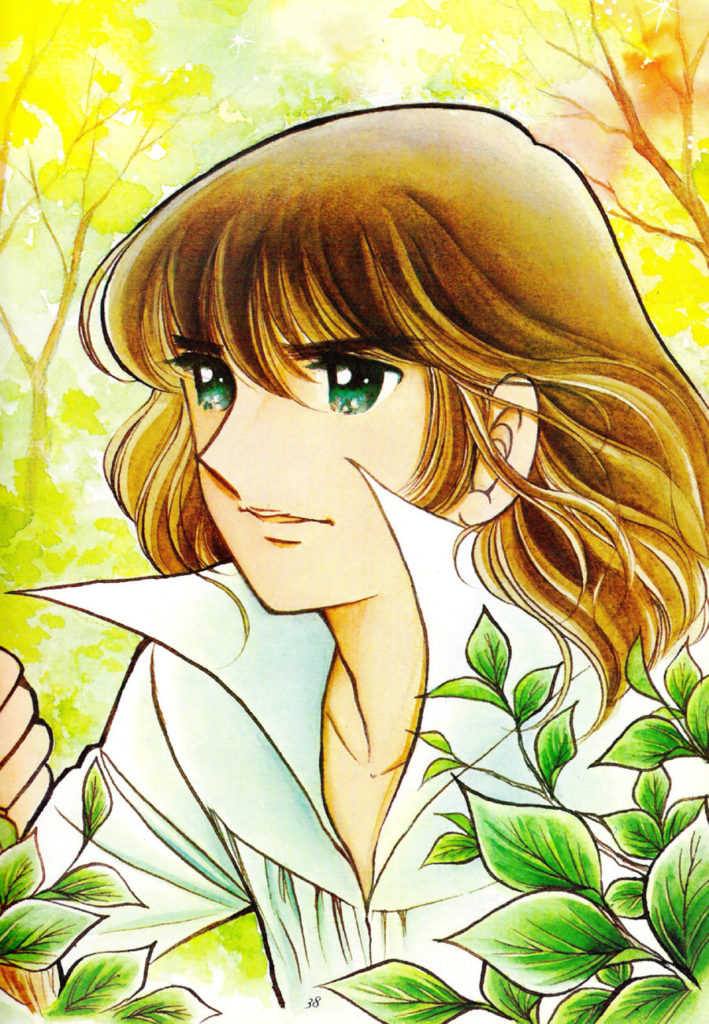
Terry’s smile is mentioned several times by Candy in the book.
You said that you would like to visit the house where I grew up one day, I remember. I still have your smile in front of your eyes the day you said it.
— page 143, volume 2, French translation.
And his voice, neither too low nor too sharp, had the ideal depth, vigorous, manly. He could display this disarming and delicate smile that melted the heart of any person.
— page 153, Volume 2, French translation
The importance of this smile is also indicated in the manga, Volume 6, page 164:

Terry . . . That smile I knew so well . . . Terry stayed the same . . .
(Thanks to @unefinheureuse for reminding me of this scene.)
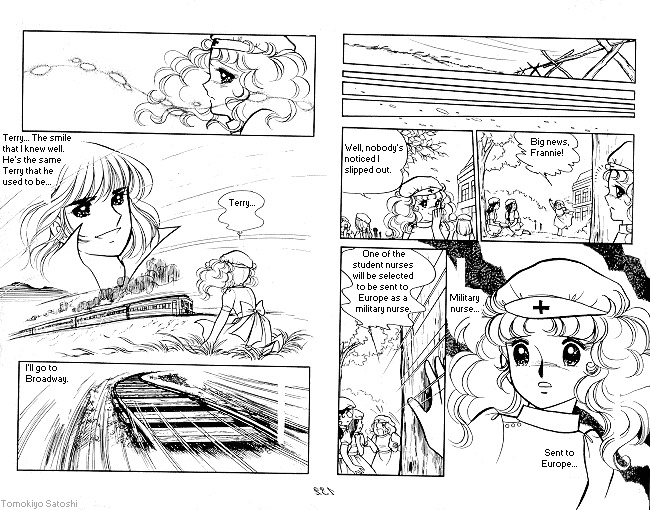
Candy, for a moment, saw Terry, and the smile of the latter. That particular smile that he addressed only to her, revived the deep feelings she felt for him.
When we read the books, we notice that she gave a lot of importance to the smiles and in particular to those of the boys whom she loved. There were a lot of references to Anthony’s smile, both when she was by his side and when she remembered him after his death. His smile was everywhere and helped her to overcome the test of mourning. Then came Terry’s, and he got all the more important as she was separated from him. This is why the smile evoked at the end of the book takes all its meaning. See page 262, Epilogue, Volume 2, French translation:
Suddenly, the light is in the room.
“What are you doing in the dark, Candy?”
That sweet voice, which always makes my heart beat.
He smiles as he looks at me on the doorstep. This smile I love.
I did not even hear his car.
“Good evening! You are back!” The voice almost veiled happiness of being able to pronounce these simple words, I get up and run into his arms.
This is the last page of the book that ended with the smile of “this person”. Candy knows this smile, she “adores” it. This smile accompanied her during all those years when they were separated, it made her heart beat, and it is with all the more joy that the author makes her exclaim:
“Welcome back home!”
お か え り な さ い!
Translated literally as “You’re back!”, it symbolizes the return of that smile that she missed so much before they found each other again.

Argument 12 – Albert versus Terry

The ambiguous end of the manga and of the cartoon had disenchanted the fans of Candy-Terry couple and left a hope to those of Albert-Candy ones. Although nothing in the manga or in the books indicates a love affair between the two characters Candy and Albert, the assumption that Albert was the lucky one persisted in the minds of some fans, whose preference naturally went to Albert.
It is worth remembering that, although Prince of the Hill, Albert is above all Candy’s adoptive father, and there is no civilized country where a dad, even adoptive, can marry his daughter, as this is deemed incest even if they have no blood relations. Candy’s story took place in the United States, and like any other Western country, this law applied.
Keiko Nagita also told me (when we discussed at the VIP meeting) that when she imagined and wrote the story of Candy, she had in mind the story of a Western heroine. Even if she wanted to write a story under Japanese influence, the result would have been the same because the Japanese law is just as categorical as the American law on this point. To be definitively clear on this subject and to stop any misunderstanding, here is what Japanese law stipulates:
An adoptive parent or a lineal ascendant of an adoptive parent may not marry with an adopted child, his/her spouse, his/her lineal descendant, or a spouse of his/her lineal descendant. #3 (Article 736)
It is considered that this remarriage prohibition is to avoid confusion as to the identification of the child’s father, between one and one’s sibling, uncle, aunt, nephew, niece by blood.
It may be a case in which this prohibition shall apply after the termination of a family relationship between the two parties.
(Source: wikipedia )
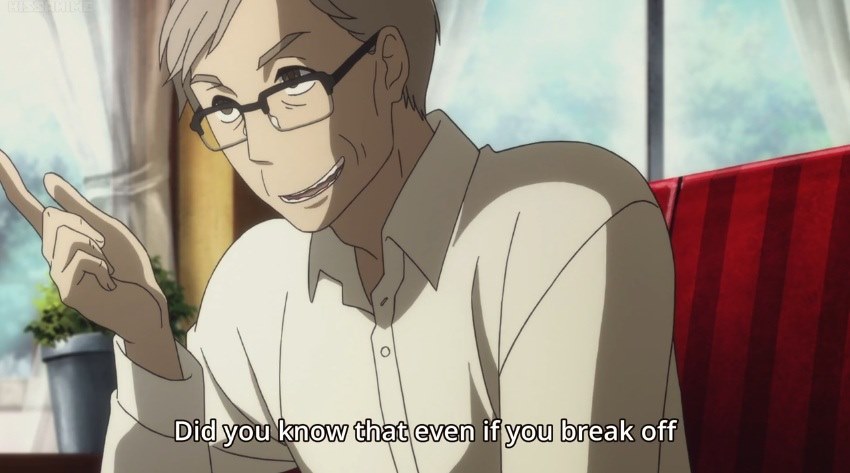
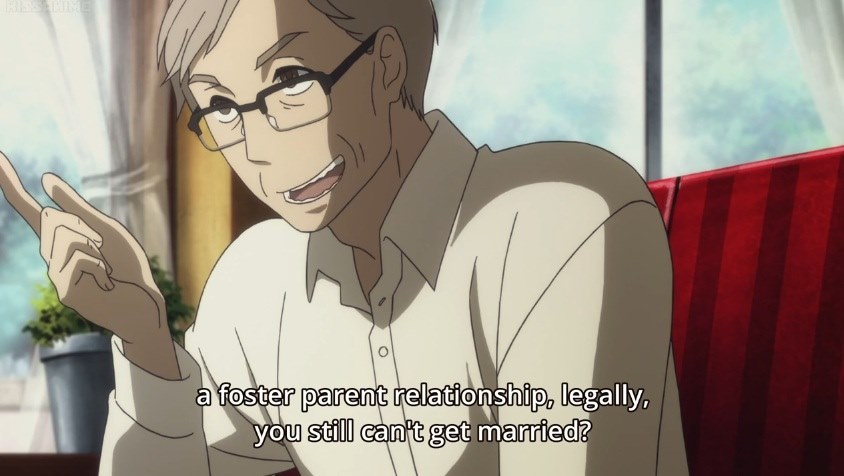 Did you know that even you break off a adoptive parent relationship, you still can’t get married? From “Shouwa Genroku” anime.
Did you know that even you break off a adoptive parent relationship, you still can’t get married? From “Shouwa Genroku” anime.
In addition, Albert was also Anthony’s uncle, Candy’s first love, and also a very good friend of Terry. There are too many skeletons in the closet!
But hey, let’s imagine that we are in a parallel universe and that all this is possible, there are several cases of which it is very easy to prove the illogical:
Imagine then that after her separation from Terry, Candy approached Albert. In this case, she would never have accepted, if not dared, to continue to live with him in the House of Magnolias. Candy had education and morals, she defended herself when she was suspected of living with a man like a couple. If she took an apartment with Albert, it was because she always considered him a fraternal or paternal figure. He reassured her, he was a shoulder to lean on and a person to confide in. That was what she did besides entrusting him with everything she felt for Terry. Here are Candy’s own words:
In other words, Mr. Albert knows almost as well as I do, my feelings towards you. He knows everything about our first meeting and how, over time … in short, he knows everything.
— Volume 2, page 204, Italian version.
Therefore, if there is a person who knows at least as much as me how much I was . . . hum . . . of you, Terry, it’s Mr. Albert.
— page 220, volume 2, French translation.
In addition, she saw no problem writing to Terry to announce that she lived with Mr. Albert. Terry was shocked at first, and then picked himself up because he realized that it was with Albert whom she lived, and that he therefore had nothing to fear. If he said to himself, it was because he knew that it was a fraternal bond which bound them both. If he had felt any ambiguity, it was a safe bet that he would have coughed!

After their separation, nothing forbade thinking that with time, Albert could feel in return some feelings for Candy. She saved him, took care of him. It is logical that he might have felt some recognition that turned into a feeling of love. And more, she became more and more pretty! This was an assumption that could be credible, but only about Albert. As for Candy, it was simply impossible because she loved Terry more than anything. Their separation was brutal and unwanted. They were forced to separate, so she could not be cured of this love by a magic wand.
Mizuki had also grumbled about it, finding that the end of the manga gave the impression that Candy was a hopeless romantic that she passed from one love to another very easily. That was why she strove to develop Candy’s feeling towards Terry in the books. In this hypothesis always, where Candy would have had a relationship with Albert, we can wonder about what one would do by learning that Suzanna was dead, and that Terry wrote to Candy to tell her that he still loved her.
We must not forget that Albert appreciated Terry, and that he did everything to reunite them. How Albert, holding Candy to his arm, could justify himself to Terry, who discovers that his friend has stolen the girl he loved and still loves? How could Albert also continue a relationship with Candy knowing how much she loved Terry (do not forget that she almost killed herself on the train the night of their separation) and knowing that he is free now? Would he not have doubts and suspicions constantly? It would become unbearable, wouldn’t it?
In addition, Albert was really a good man, and I do not imagine him doing that to his best friend. If he wanted to get close to Candy, he would quickly given up, considering first of all, that it did not happen, but also because she could never love him as much as Terry, and that would be lost, especially since the beautiful aristocrat has reappeared. Did he not tell her in the manga that he would have done like her, when Candy in tears told him that she broke up with Terry and gave up on him for his own good? This was in Candy Candy manga, tome 8, page 42, editions Kondansha.
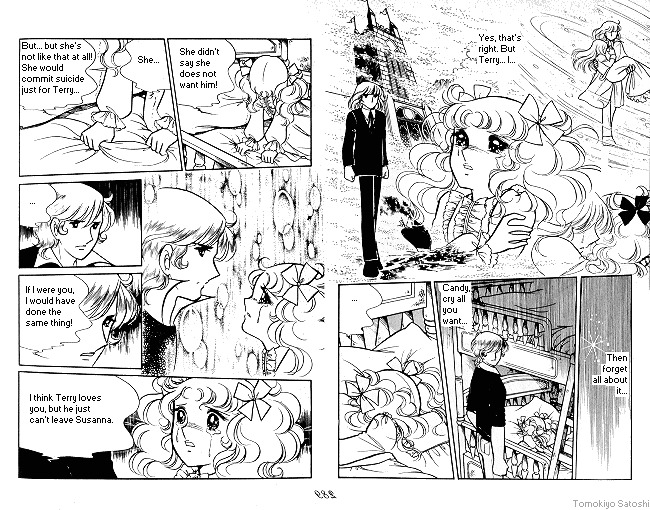
So the hypothesis Albert-Candy no longer stands for these reasons. Albert would have moved aside for Terry because he knew deep inside him that it was Terry whom she has always loved. On the other hand, NOTHING indicated in the book that she felt anything other than tenderness towards him. She continued to call him Mr. Albert, or great Uncle William, sometimes Bert as his sister, Anthony’s mother, nicknamed him. Every word, every sentence she sent him could, of course, be interpreted according to the good will of each fan. But those would be interpretations based on one’s own expectations, assumptions, whereas what is concrete, what is written in black in the book, is the love she felt for Terry.
To conclude on the assumption that Albert felt love with Candy, it would be a safe bet, in this case, that she never knew. Like Alistair, he would have been content with loving her from afar and protecting her.
We feel a real attachment from Candy to Albert, but when we read and re-read the books, we feel that it is only a filial or friendly attachment. It visibly represents a base for her, a protective force. A strong link binds them because they are very similar in their way of acting and seeing life.
This is what she told him in Volume 6 of the manga when Albert disappeared from the hospital and she seeks everywhere:
I lied to you when I told you that I had a big brother, in fact, I’m an orphan … That’s why I found you, Mr. Albert, a real big brother … A real brother … Yes I feel so quiet with him.
But when Terry’s memories arose, the words used by Candy are no longer the same. She opens her heart and gives herself up completely when talking about him.
In the way, the last letter in Final Story is a very nice letter from Candy to Anthony. In this letter, Candy told him about Terry:
In London, I had a deep connection with a person who looks like you – in fact, he looked like you only a moment. In truth, you are completely different people. But in any case, thanks to this boy I discovered that love has many forms.
— Volume 2, page 236-237, Italian translation.
In London, I was terribly bewitched by a boy who looked like you … Finally, for a moment, I thought he looked like you, but maybe he was the exact opposite. It revealed that what we call love can come in different forms.
— Volume 2, page 258, French translation.
She had also mentioned this in her retrospective, just before the letters she exchanged with Albert in the Epilogue:
Sometimes I wonder what would have happened if he was not dead. I think we would all have stayed in Lakewood and no one would have gone to study in England. Of course, If I had not gone, I would have never met Terrence, I even thought it was really Anthony who had put Terrence on my way.
— Volume 2, page 199, Italian translation.
Maybe it was Anthony who sent me to meet Terry … I happened to think so.
— Volume 2, page 216, French translation.
Candy had two loves in her life and they are Anthony and Terry. Candy managed to mourn Anthony, thanks to Terry. This Terry that destiny would move away for a few years and that it would eventually come together, because love always triumphs, does not it?

Conclusion
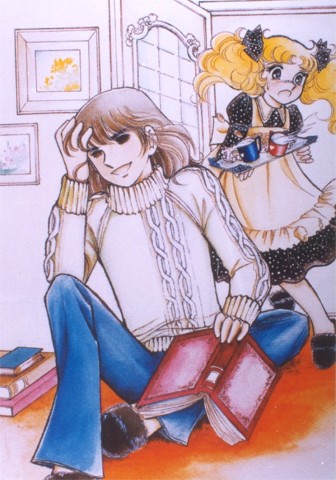
After reading these arguments above, it’s hard not to conclude that the person who lives with Candy is Terry. The main clues that prove it are above all the fact that:
1 – Suzanna is dead, it was the only obstacle between Terry and Candy. Her death frees Terry from his obligations. The fact of knowing that they have never been married says a lot about the couple they formed.
2- After his period of mourning, Terry writes to Candy to tell her that he still loves her and inquire about her feelings. His hesitation to write to her proves that he does not know what has become of her or where she is. If Candy had a relationship with Albert, given the fame of the Ardlay family, it would have appeared in the newspapers. There would have been an engagement, certainly something official. Here, he is in the total blur, which means that Candy has no official life with the Ardlay and therefore she has moved away.
3 – Candy, adult, lives in England, in the city of Shakespeare,Stratford-Upon-Avon. This is the city where lived the favorite author of Terry, the one to which he owes all his career and which made his fame. What other place than this one to best symbolize Terry, is not it?
4- Terry’s Letter.
5 – Candy’s library is filled with books by this author. Who would keep books that would remind the person you loved if you did not live with him?
6 – Candy’s house is surrounded by daffodils in bloom. The daffodils symbolize Terry. Once again, why would she live in a place that reminds her so much of Terry if she did not live with him?
7 – Albert is the foster father of Candy. It is forbidden by law to marry his adopted child, so in no case can Albert be “that person”. These clues can not be contradicted because they are factual. They all lead straight to Terry. Terry is Anohito/this person.
During my VIP meeting with Keiko Nagita, I was able to talk to her again just as everyone was leaving. I asked her this: “Is Terry happy?”
Nodding her head vigorously, she said, “Yes, he is!” But smartly, understanding the implication of my question, she was eager to added: “They are all happy!”
In answering this, she remained ambiguous, this ambiguity voluntary to avoid offending her fans. But how could Terry be happy without Candy??? So, if he is happy, and if Candy is happy, it’s because they are married and happy together!

*All guest comments and replies will be posted upon Admin approval.


18 Comments
HI @Monica. I think it is one of the things Nagita let open for us to imagine why Terry uses the same signature T.G. but I think Albert didn’t show the diary to Candy because it is so personal.
But Candy and Terry could know that T.G code because:
– They used it in their private messages at Saint Paul or Chicago.
– it is a Nagita’s lapsus.
– Albert teased Terry with that code in any conversation they had after Candy and Terry broke up…
Hugs
Come si può spiegare il T.G. della lettera di Terence a Candy. Può Albert che aveva il diario di Candy aver aiutato la coppia rimettersi assieme?. Candy chiama così Terence nel proprio diario e lui si firma così. Tutti sono felici. Terence e Candy perché tornano insieme. Albert perché fa una buona azione nei confronti della sua pupilla e del suo amico. Può essere una conclusione valida?.
@Tiger Grandchester, imagine Terry learning that Candy and Albert were married! I don’t think he would be like: oh, I’m so happy for Candy! Only I wish for her is to be happy with the man she loves the most! That surely doesn’t sound like Terry lol. Judging from anime’s Terry, he would get angry and maybe he would be a little bit jealous, too. However, what troubles me is that 6 years have passed from their separation and of course they have grown up and they are matured now. They couldn’t think the same way as when they were 16…What if novel’s Terry learned that (let’s say) Candy married Albert and did absolutely nothing about it?….Man, I would be so disappointed if things went that way. That wouldn’t be the man I knew…
But of course, it’s all Mizuki’s fault lol! She just hasn’t cleared things out! We don’t even know if at the end of the novel Candy has children or not! I wonder, wasn’t she sure about the ending or she knows everything but she just wants to annoy as readers lol?
Candy seguía a Terry por los periódicos. Ella estaba pendiente de él. Ella quería contarle a él que el tio abuelo William es Albert.
La sra del magnolia, se enteró por los periódicos de la verdadera identidad de Albert, y en seguida ella les escribió para pedirles perdón por haberlos echado. Candy responde a la señora del magnolia con una carta tranquilizadora.
• Eso significa que Terry también se enteró de la verdadera identidad de Albert por medio de los periódicos. El tío abuelo William del que Candy tanto le hablaba a Terry. El suegro a punto de morir que Terry imaginó, resultó ser su amigo Albert XD
• Terry quizás también seguía noticias de la familia Ardlay, él sabía que Candy estaba soltera. Incuso quizás Terry tuvo contacto con Albert. La razón por la que me atrevo a pensar esto, es por como firma su carta ->T.G , igual que Candy lo nombraba a él en su diario.
Si Candy estuviera casada. Terry no irrumpiría en su vida.
De la misma manera, Terry nunca se casó con Susana, Candy seguía manteniendo una esperanza
Que buen aporte respecto a la firma de la carta con T. G., también creo que Albert pudo haber cuidado a Candy manteniendo contacto con Terry, es extraño que Albert se hay distanciado de Terry una vez recuperada la memoria!!
Lo que si puedo aportar a modo personal… una vez que terminé de leer el libro por primera vez tuve la sensación de que anohito podía ser una tercera persona… tuve la sensación de que Candy estaba en paz porque todo el dolor que pasó con Anthony y con Terry fuera necesario para llegar a esta nueva persona. Lo menciono por la cantidad de años que pasaron desde la separación. Pero claro después de ver las “pistas” difícil no ver a Terry con su amado (además nuestros corazones lo necesitan, ya que queremos que Terry tuviese un final feliz después de haberlo pasado tan mal).
Me alegro que Nagita nos informe que Terry es feliz, porque para mi fue el gran vacío que dejó el libro, que aunque se liberó de Susana con la carta a Candy deja una posibilidad de nuevo dolor para Terry si Candy no le corresponde.
Por último, antes de CCFH yo encontré paz leyendo Reencuentro en el Vórtice, ahora “Entre páginas blancas” ayudó a calmar el vacío de la ambigüedad de Nagita. Tengo confianza que ella escribió algo mas sobre Candy que se publicará al final de su final.
Saludos, disfruté mucho leyendo los análisis Pro Terry.
Terry is anohito without a doubt. If Candy is married to Albert, it must be reported by a journal or something like that. The Andrew is so famous. And Terry musn’t have written that letter to Candy. Candy was ~18 and Terry 20 at the end of the story (manga), and Candy was ~30 and Terry ~32 in the CCFS, very well suited to the age after 8y of Susana’s death and after 1,5y of the Terry’s letter. Certainly they went back and got married. Furthermore, they are in England- Terry’s hometown. Albert is always a good friend and good brother to Candy
Lo lei hasta el.final me encanto saver que Terry era anohito,candy es mi dibujo favorito desd mi niñez….me encanta saver q Candy y Terry stan juntos nuevamente❤🌹
Merci Sophie pour cette analyse qui est très claire.
Il n’y a aucun doute : Anohito est Terry
Candy et lui se retrouvent et se marient, après la mort de Suzanna
Albert had George as driver 🙂 and before to lose his memory he was travelling by train. The only time were when he drove the car when he recovered his memory and he did not wanted that Candy to know (were in that time when Neil had closed Candy in that house and Albert come to search her). We can see Terry driving his car from the beginning as he reached in England when he came on the same ship with Candy and in US when Candy came to see him in Romeo and Juliet, he took her by his car.
“I did not even hear his car“`- is another clue which show that Terry is anohito. In the anime we can see his passion to drive the car, which is not characteristic for Albert
Exactly! But the Alfans keep saying only Albert drove cars. 🙄
Esos de pika actuaron peor…manipulando la novela a su conveniencia eliminando aspectos importante….por que? Es un hecho que esas pistas conllevan a Terry y como su público es alberfans. Tenían que vender. Mercadeo señores. Les vendieron mentiras por dinero.
Definitivamente Terry y Candy consumaron su amor… Para que hacer un libro donde se habla del amor de la dos si va a tener otro esposo qje no sea Terry… Sería ilógico. Todo es claro. Gracias por tu análisis profundo y con evidencia clara en cada bibliografía aportada ..
Je n ai jamais douté que Candy retrouverait Terry… Merci pour toutes vos recherches qui confirme l union de Romeo et Juliette 😘😘😘 version Candy ❤Terry .
Simplemente Gracias por ese análisis tan preciso.
Thanks for the deep analysis!!! I thought Terence was the one, now I am dure and really happy for that!!! Merci 😃
Hermoso no pare hasta que termine de leerlo, siempre estado segura que es Terry nunca lo dudé
AMAZING ANYLISIS DEAR CANDYNEIGE!!! AND ALSO AMAZING ANSWER YOU GOT FROM NAGITA!!! YES!!! TERRY IS CANDY´S HUSBAND, NO DOUBT ABOUT IT, CCFS SHOUTS IT SO LOUD!!!!